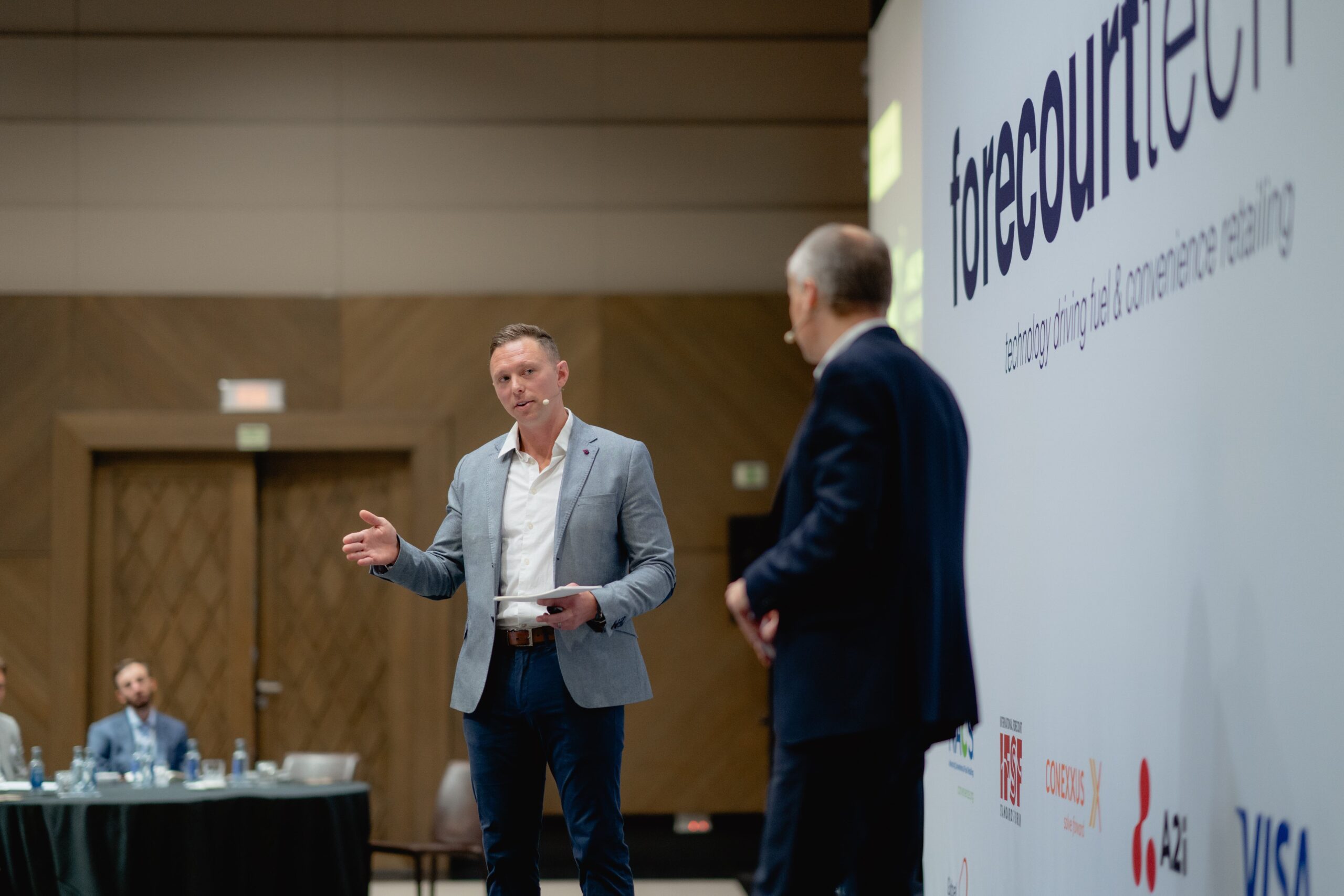The sixth edition of forecourttech began in the usual fashion as Mark Wohltmann, Director of NACS Global and conference moderator outlined the key global retail trends within the industry. New mobility, data and analytics and retail format development were the key talking points and it was no coincidence that these themes were woven throughout the conference programme.


With the tone set, Mark was able to draw on examples from NACS’ vast, global network to illustrate how things are changing from Cafe Amazon, the PTT-owned coffee brand, which is now the sixth largest coffee chain in the world to South-African fuel retailer SASOL’s five-star store and restaurant concept. Retailers are no longer just interested in selling oil, but are increasingly moving towards hospitality, not just as an additional service but as stand alone solutions.
Investment in technology is also essential to enhance the customer experience of today’s connected, tech-savvy consumers. Mark highlighted augmented reality and biometric payments as examples of how technology is being used throughout the industry to enhance the customer experience from bringing services to life to creating a frictionless experience.
The observations outlined in Mark’s presentation were brought to life as Oleksandr Koliakin, Global GM Digital Customer Solutions & Platforms at Shell outlined the company’s retail strategy. EV charging and opportunities arising from the digital revolution were the key themes as he also discussed the need for seamless technology, hyper-convenience and personalised rewards. Shell now boasts a roaming network of 500,000 public charge points across Europe and has recently introduced a route planner on the Shell Recharge app. The user-friendly addition to the app aims to make your EV journey even more convenient and hassle-free.
Oleksandr also outlined the expansion of digital services including on demand delivery, pick up and drop off locations and battery swaps stations. Beyond the forecourt, he also discussed the growing footprint of Shell Cafe and Shell’s entry into the Metaverse to create a more personalised, immersive and engaging experience.
Creating a seamless experience
Jörg M. Heilingbrunner, CEO at Scheidt & Bachmann Fuel Retail Solutions highlighted how their solutions are helping mobility hubs to create seamless customer journeys.
He explained how EV charging is the biggest game changer for petrol stations as new destination and new players enter the market. He explained how a frictionless customer experience is a key success factor for mobility hubs as well as introducing added value services that improve the experience of today’s customers.
These themes were also discussed during the mobility panel moderated by Dan Munford, Managing Director at Global Convenience Store Focus. The panellists Oleksandr Koliakin; David Cornish Head of Product at Techniche and Richard Campion Head of Fleet and Mobility at Visa discussed the changing forecourt. Oleksandr reiterated Shell’s aim to be a global leader in the EV space. David Cornish outlined the importance of charger availability and uptime both in terms of customer service and for business reputation and Richard discussed how making a payment a forgettable as possible is the ultimate goal, which looking ahead, will likely involve an increasing move towards in-car payments.
Gary Szendzielarz, Director International Business Development at Cloudics also covered similar themes, outlining how businesses can leverage new technologies and business models to offer innovative products and services. He explained how retailers are changing business models to get the best out of their business, using cross-sector digital payments and personalised engagement to get ahead.
One of the key barriers to creating these compelling customer experiences however is bridging the gap between legacy systems and new technologies. Michel Hinfelaar, CEO & Senior Consultant at Haia Consultancy outlined how introducing alternative energies on the forecourt, cloud-based solutions, AI, and IoT devices can bring operational efficiencies and improved customer experiences, however adapting existing architectures for this transition is crucial. He said that whilst the shift from isolated forecourt systems to interconnected cloud-based solutions and API technology does present a transformative challenge, it’s also an opportunity for industry standardisation, innovation, and enhanced capabilities.
Doomsday or saviour?
Inevitably, artificial intelligence was a key talking point and it was down to Gray Taylor, Managing Director of Conexxus; Frodi Hammer, CEO at fuel-pricing specialists A2i and Ferrando Carrasco, CEO at Locatium to answer the question – AI: Doomsday or saviour?
The panel of AI experts discussed the use cases for AI including inventory management, theft prevention, dynamic pricing, network planning, hyper-customisation and improving operational efficiency, to name a few. There is a huge amount of data available to fuel retailers and, as Frodi outlined, the data is extremely valuable but it needs to be actionable and that is where autonomous systems can really give retailers the edge over the competition.
Data was the cornerstone of the talk delivered by Matthijs Machielse CTO at BigBrother. On a simple level, BigBrother is a camera company concerned with security on fuel stations, however through their use of technology and their willingness to collaborate they have embarked on a variety of projects that help to synchronise systems and create a more compelling customer experience. One example highlighted by Matt was using number plate recognition so customers could simply drive in and drive off, the payment for the fuel initiated automatically. This could also be extended to the car wash, which in turn provides more data about customer behaviour on the site. Matt outlined that by synchronising systems it allows retailers to better connect with the offline customer. The key takeaway from his presentation being that open collaboration is critical to future success.
Autonomous stores
The topic of autonomous stores was covered extensively from an academic, retailer and solutions provider perspective.
Professor Sabine Benoit outlined the four main drivers for autonomous stores:
1) Increased consumer expectations.
2) More tech readiness
3) Staff costs
4) Cost of technology
Autonomous stores are currently in a trial and error phase. Sabine highlighted the case of Amazon Go, who when they launched in 2016 estimated that by 2021 they would have 3000 stores, today they have just 40. So what is going on, is the concept not working?
By analysing the different store applications across the world and customer perceptions, Sabine was able to identify some key themes. Consumers generally preferred staffed stores and stand alone, rural locations. Her research also found that a barrier at entrance should be removed, basket verification should be immediate and there was flexibility in regards to tech choices with fully autonomous stores not deemed essential.
JUXTA, launched their fully autonomous stores last month. As Jake Patton Head of Sales, North America at JUXTA explained, the store is a solution to some of the key sticking points in the industry and whilst the fully-autonomous store is unmanned and an entrance barrier is in place in the form of credit card entry, the concept counters many of consumer concerns identified by Sabine. Basket verification is instant and the experience is as seamless as it gets. What really sets the store apart is the ability to move it from location to location with ease. If the store isn’t working it can simply be moved to a new location and due to its size it can help retailers access new, untapped markets.
João Dinis Soares, Lead Retail 4.0 Technological C-Store Transformation Manager at Galp and Mehmet Tözge, Director Smart Store Development at Lekkerland both presented details of their use of smart stores within their retail networks. Galp has recently renovated 600 stores introducing a hub concept that features EV mobility services, coffee and seating areas. Joao described convenience as “the other energy” and outlined how they are using technology to remove barriers and create fast, seamless check out experiences.
Mehmet shared how Lekkerland’s smart store strategy came about as a result of a shift in consumer expectations. Rather than adopting a one size fits all approach, Lekkerland has a number of different store concepts to suit a variety of needs including smart vending machines, 24/7 standalone smart stores, hybrid stores and smart lounges.



